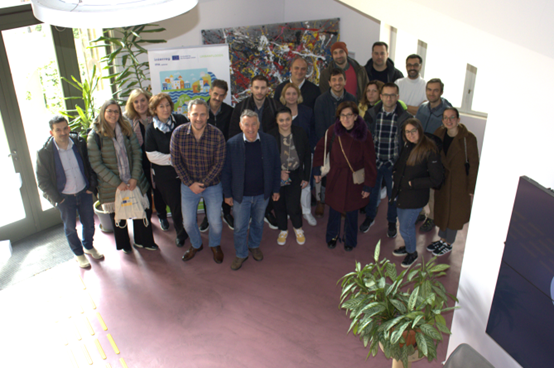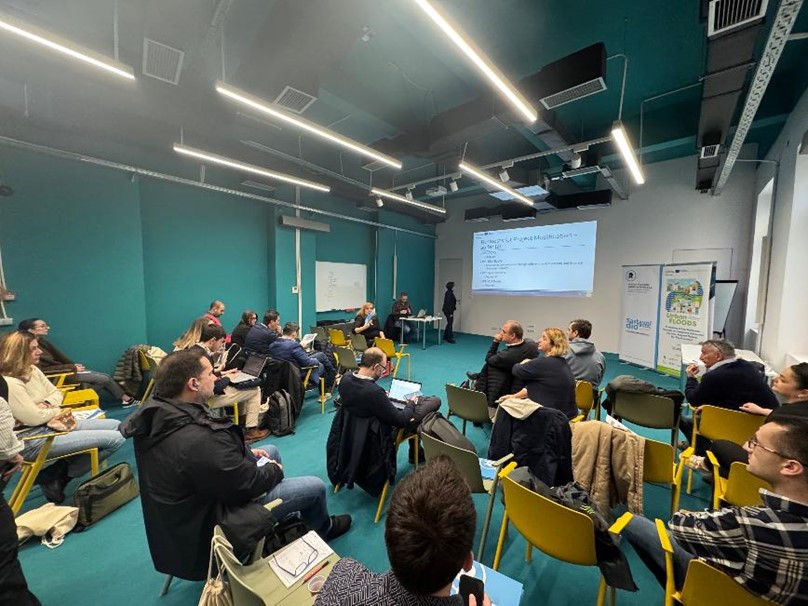
2nd URBANFLOODS Project Meeting
2nd URBANFLOODS Project Meeting – April 8–9, 2025 | Rijeka, Croatia
The 2nd Project Meeting of the URBANFLOODS project (Promoting Urban Resilience Through an Integrated Advanced Decision Support System for Flood Control), co-financed by the Transnational Cooperation Programme INTERREG VI –B Adriatic–Ionian ADRION 2021‐2027 and coordinated by University of Western Macedonia (UOWM), was successfully held on April 8–9, 2025, in Rijeka, Croatia. The meeting was hosted by Rijeka Development Agency PORIN Ltd. (RDA PORIN) and took place in a hybrid format, bringing together representatives from all eleven project partners across eight Adriatic–Ionian countries. These include: UOWM (Lead Partner) and the Municipal Enterprise for Water Supply and Sewerage of Kozani (DEYAK) from Greece; Hydrowater-Albania (HydrowaterAL) from Albania; Hydro-Engineering Institute Sarajevo (HEIS) from Bosnia and Herzegovina; Ss. Cyril and Methodius University in Skopje (FCSE-UKIM) and Center for Knowledge Management (CKM) from North Macedonia; Macerata Municipality (MC) and SVI.MED. EuroMediterranean Center for the Sustainable Development (SVIMED) from Italy; Development Centre Murska Sobota (DCMS) from Slovenia; Regional Development Agency Backa Ltd. Novi Sad (RDA Backa) from Serbia; and the host organization, RDA PORIN, from Croatia.

Also participating in the meeting were two associated partners: the Ministry of Environment and Energy, General Directorate for Water, associated with the Lead Partner (UOWM), and the Public Institution for Protected Area Management in the Primorje-Gorski Kotar County (JU Priroda), associated with RDA PORIN.
The meeting started with a comprehensive project status update by the UOWM, represented by Professor Malamati Louta, Vice Rector for Administrative and Financial Affairs, Director of Telecommunication Networks and Advanced Services (TELNAS) Laboratory. Prof. Louta also provided updates on project coordination and financial management, and chaired key strategic discussions. This was followed by a financial progress review and a discussion on project modifications. The meeting then moved into key technical sessions, which focused on assessing the status of data collection across the pilot sites and providing a detailed overview of flood modelling techniques. Presentations were delivered by HydrowaterAL and HEIS, outlining methodologies and progress up to date, while project partners presented the pilot cases’ progress. The session continued with contributions from FCSE-UKIM, presenting the planned structure of the central GIS database and focal aspects of the Decision Support System (DSS), both of which are core components of the URBANFLOODS platform.

The second day began with a thematic contribution from JU Priroda giving an overview of the biodiversity and environmental features of the Rječina River, the Croatian pilot site. This was followed by a session on the harmonized knowledge base, URBANFLOODS KNOWBASE, during which each country presented national contributions to its joint development on current policies and measures for flood prevention and impact mitigation. SVIMED, as the responsible partner for Communication, provided updates on communication, dissemination, and exploitation activities, including media outreach, branding, and engagement with thematic networks.
The meeting wrapped up with a session on the next steps, including reporting obligations, time planning of the upcoming deliverables, and the planning of the next project meeting. It concluded with the 2nd Steering Committee, which convened to ensure sound project governance and alignment across the consortium. Following the meeting, participants joined a “Walk & Talk” field visit, guided by the Urbanisepare collective, to explore the Rječina pilot site. The visit included stops at the Zvir river spring and the newly established Sinergana incubator, providing real-world context to the urban water challenges and opportunities addressed by URBANFLOODS.
This second meeting marked an important milestone in the implementation of URBANFLOODS, reaffirming the consortium’s commitment to collaborative action for urban flood resilience and integrated risk management across the Adriatic–Ionian region.
For more information about the project, visit: https://urbanfloods.interreg-ipa-adrion.eu/
This has been produced with the financial assistance of the European Union. The content of the document is the sole responsibility of University of Western Macedonia and can under no circumstances be regarded as reflecting the position of the European Union and/or IPA ADRION programme authorities.




